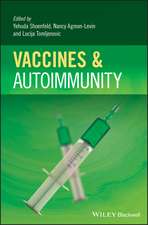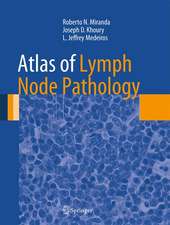The Biology of Idiotypes
Editat de Mark Greeneen Limba Engleză Paperback – 18 mar 2012
Preț: 388.12 lei
Preț vechi: 408.54 lei
-5% Nou
Puncte Express: 582
Preț estimativ în valută:
74.28€ • 77.26$ • 61.32£
74.28€ • 77.26$ • 61.32£
Carte tipărită la comandă
Livrare economică 14-28 aprilie
Preluare comenzi: 021 569.72.76
Specificații
ISBN-13: 9781468447415
ISBN-10: 1468447416
Pagini: 524
Ilustrații: XV, 507 p. 130 illus.
Dimensiuni: 178 x 254 x 28 mm
Greutate: 0.9 kg
Ediția:Softcover reprint of the original 1st ed. 1984
Editura: Springer Us
Colecția Springer
Locul publicării:New York, NY, United States
ISBN-10: 1468447416
Pagini: 524
Ilustrații: XV, 507 p. 130 illus.
Dimensiuni: 178 x 254 x 28 mm
Greutate: 0.9 kg
Ediția:Softcover reprint of the original 1st ed. 1984
Editura: Springer Us
Colecția Springer
Locul publicării:New York, NY, United States
Public țintă
ResearchCuprins
I. Molecular Genetic Aspects of Idiotypes.- 1 Idiotypic Determinants, Minigenes, and the Antibody Combining Site.- 2 The Genes Encoding Anti-NP Antibodies in Inbred Strains of Mice.- 3 Structural and Genetic Basis of the Major Cross-Reactive Idiotype of the A Strain Mouse.- 4 The Molecular Genetics of Phosphocholine-Binding Antibodies.- 5 Genetic Rearrangements of Human Immunoglobulin Genes.- 6 Analysis of the GAT B Repertoire.- 7 Structural Correlates of Idiotypes Expressed on Galactan-Binding Antibodies.- II. Serologic and Structural Correlates of Idiotypes.- 8 Idiotypic Markers and the Three-Dimensional Structure of Immunoglobulins.- 9 Combining Site Specificity and Idiotypy: A Study of Antidigoxin and Antiarsonate Antibodies.- 10 The Murine Antibody Response to Phosphocholine: Idiotypes, Structures, and Binding Sites.- 11 The Limiting Dilution Approach to the Analysis of the Idiotypic Repertoire.- 12 Antibody Diversity in the Response to Streptococcal Group A Carbohydrate.- 13 Idiotypes of Ir Gene-Controlled Anti-GAT Response.- 14 Cross-Reacting Idiotypes in the Human System.- III. Regulation of Idiotypes.- 15 Genetic and Environmental Control of B-Cell Idiotype Expression.- 16 Quantitative Estimates of Diversity, Degeneracy, and Connectivity in an Idiotypic Network among T Cells.- 17 Expression of Anti-MHC Idiotypes in Immune Responses.- 18 Murine Plasmacytoma MOPC315 as a Tool for the Analysis of Network Regulation: M315 Idiotopes are Inducers and Targets of Immunoregulatory Signals.- 19 Idiotypic Suppression of B-Cell-Derived Tumors: Models for Lymphocyte Regulation.- 20 Idiotype and Anti-Idiotype Regulation of Antipolyfructosan Response: Role of Regulatory Idiotopes.- 21 Idiotype-Specific T Cells: Role in Regulation.- 22 The Role of Idiotype and of Immunoglobulin in T-Cell Differentiation and Function.- 23 Helper T-Lymphocyte Influences on Idiotype-Bearing B Cells.- 24 Autologous Idiotope-Specific T Cells in Regulation of Antibody Response.- 25 Idiotype Regulation in the Antibody Response to Phosphocholine: Antigen Selection of B-Lymphocyte Subsets with Differential Idiotype Expression?.- 26 Auto-Anti-Idiotype Production During the Response to Antigen.- IV. Structures on T Cells.- 27 Suppressor T-Cell Hybridoma with a Receptor Recognizing KLH-Specific Suppressor Factor.- 28 Role of Idiotypes in the (4-Hydroxy-3-Nitrophenyl) Acetyl (NP)-Specific Suppressor T- Cell Pathway.- 29 Differential Expression of Igh- 1-Linked T-Cell Alloantigens: Antigen Receptors or Evolutionary Rudiments of Immunoglobulin Genes?.- 30 Mechanisms of Idiotypic Control of the Antibody Repertoire.- 31 The Role of Idiotype in T-Cell Regulatory Events.











